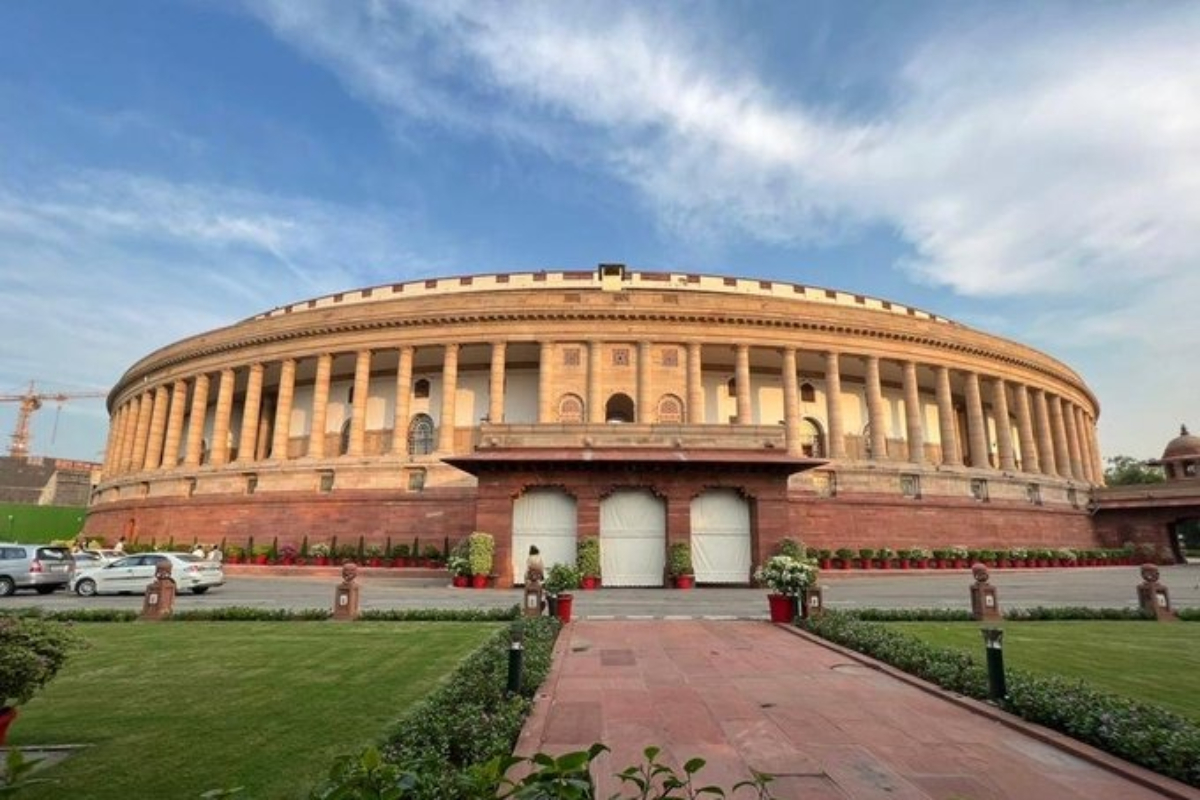Chhattisgarh BJP Govt set to investigate former Congress’ cow dung procurement
BJP lawmakers and ministers launched a scathing onslaught on the Congress, leveling accusations of corruption against them during their tenure.
Backstage talks for peace in the chambers of the presiding officers were either shunned or non-productive, as the two sides were unwilling to yield any ground.

Representation image [Photo: Twitter/@ANI]
Government-Opposition fights have been common during Parliamentary sessions, but they ended in victories for both sides. The Budget Session that concluded last week had no resolution of differences, and neither side won.
Parliamentary chambers heard both sides shouting slogans while clearing budgetary proposals without debate or discussion. Lok Sabha Speaker Om Birla and Rajya Sabha Chairman Jagdeep Dhankhar had a tough time as Treasury Benches had also taken resorted to creating a ruckus over their demands and replied to the Opposition’s slogans with their slogans.
Backstage talks for peace in the chambers of the presiding officers were either shunned or non-productive, as the two sides were unwilling to yield any ground. What should take precedence over all other matters, perhaps never occurred to floor leaders of the two sides which comprise the two parts of Parliament?
Advertisement
This left the most significant event of Parliament’s yearly calendar, the Union Budget un-discussed and un-examined, leaving the government and the nation without the benefit of the Opposition’s scrutiny which alone can raise questions and make the government accountable.
Participation of members from different corners of the chambers brings feedback without which the government can go blank about what the common man thought, and how correctives could be planned. The two-way exchanges have always brought much education to all, whether they are heard on television or in the Chambers.
The first part of the session was certainly better in its productivity. The Motion of Thanks to President Droupadi Murmu for her address to a joint sitting of Parliament was adopted after Prime Minister Narendra Modi’s reply.
There was a general discussion on the Union Budget also, with reply by Finance Minister Nirmala Sitharaman. Signs of disruption in the coming days were, however, visible when the government did not accept the Opposition’s adjournment motions to discuss the implications of the Hindenburg Research reports on the Adani Group’s alleged financial irregularities. The Government claimed it had clarified the position on the Hindenburg report when the finance minister said market regulatory authorities were seized of the matter.
Congress leader Rahul Gandhi questioned if the Adani Group was favoured by the government. Trinamul Congress members said the ED was used against the Opposition only. The DMK joined the Congress in demanding a Joint Parliamentary Committee (JPC) to probe the Adani Group issues. The prime minister replied in the Lok Sabha saying the criticism is part of democracy but what the country witnessed during the last nine years was compulsive criticism by people who were not able to accept the world appreciates India’s potential and looked towards it with hope and expectation.
In the Rajya Sabha, the prime minister’s 90-minute reply was heard amidst non-stop slogan shouting by several Opposition members in the well of the House. When Parliament met for the second part of the Budget Session, Treasury Benches shouted for Mr Gandhi’s apology for his comments on Indian democracy and Parliament in his UK speeches. The Congress and other Opposition parties objected to this and kept up their slogans for a JPC inquiry into the Adani matters.
Slogan shouting has become a major mode of expression when it comes to making a point. The Budgetary documents were placed and cleared without any debate amidst the disorder seen in the next working days. The Treasury Benches became peaceful after Gandhi was disqualified from the Lok Sabha on 24th March, following his conviction by a Surat court in a criminal defamation case over his “Modi surname” remark. This made the Opposition even more aggressive in its sloganeering.
The Opposition forgot what is expected from it is not shouting slogans, but effective criticism. The government too waits for rational arguments to remove infirmities in governance. Leader of the Opposition in the Rajya Sabha Mallikarjun Kharge had objected to Leader of the House Piyush Goyal’s reference to Gandhi’s speeches and referred to a convention that members of one House do not discuss the conduct of members of the other House in Parliament.
The Chairman ruled: “Any curtailment or qualification of the constitutional privilege of freedom of expression, of a Member of the Parliament in the Rajya Sabha will seriously compromise and impede the blossoming of democratic values.”
As the Chairman said later, the ruling had “fortified” the right of expression of the Rajya Sabha members for all times. The problem of decorum witnessed during the Budget Session is not new and in November 2001 a national conference of presiding officers and Chief Ministers was held in Parliament House to discuss “Discipline and Decorum in Parliament and Legislatures of States and Union Territories.”
Worried over the state of affairs, a presiding officer said “The presiding officers, of course, have been vested with supreme powers within the Chambers. But they cannot obviously breathe discipline in the members through punitive measures.”
Recalling the spirit of give and take that once prevailed in Parliament, then Rajya Sabha Chairman Bhairon Singh Shekhawat told the meeting to celebrate the 200th session of the Upper House on 11 December 2003, “While rejecting an amendment moved by C Rajagopalachairi, Pt Jawaharlal Nehru had said ‘You see Rajaji, the majority is with me. Rajaji retorted ‘Yes, Jawaharlal, the majority is with you but the logic is with me.’ Pt Nehru laughed with the House and accepted Rajaji’s amendment.”
Advertisement